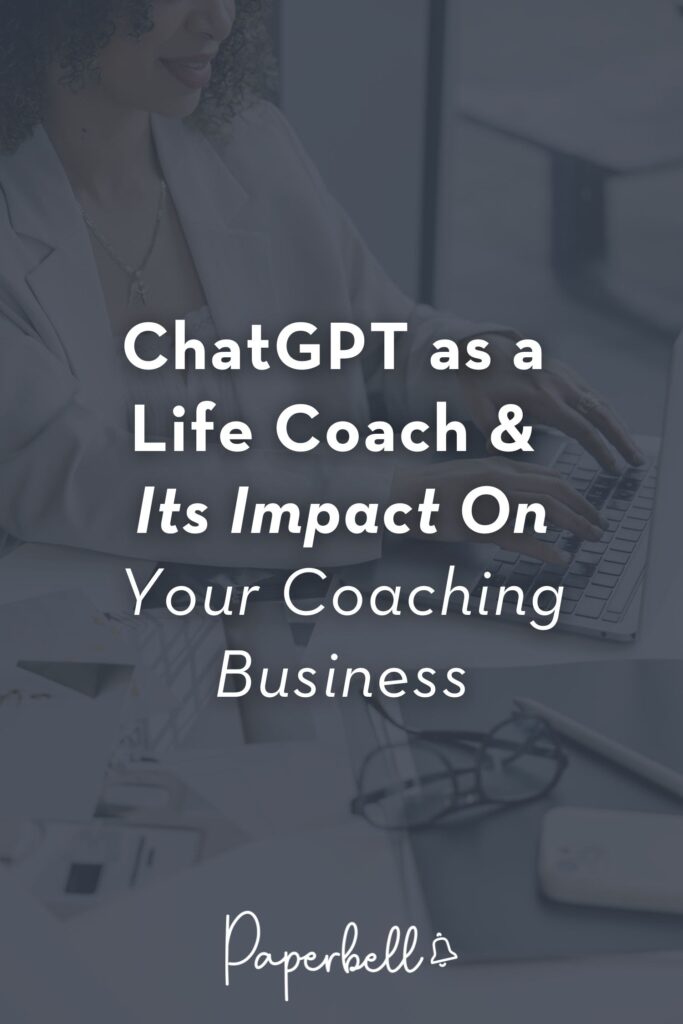If you’re a life coach, you’ve probably noticed something shifting in your industry. Maybe a potential client mentioned they’ve been “working with ChatGPT” on their goals. Or you’ve seen people online sharing how they use AI as their personal life coach.
Yes, it’s true: artificial intelligence is changing how people approach personal development and coaching.
This might feel threatening at first. But understanding these changes can actually strengthen your coaching practice and open up new opportunities.
So, let’s talk about it.
How ChatGPT and Other AI Tools Are Changing The Life Coaching Industry
According to OpenAI CEO Sam Altman, college students are turning to ChatGPT for more than homework help. They’re using it to make real decisions about their:
- Goals
- Relationships
- Routines
- Entire future
This trend goes way beyond college campuses. Do a quick scan of Reddit, YouTube, or Medium, and you’ll see people who are creating custom GPT life coaches and using them daily.
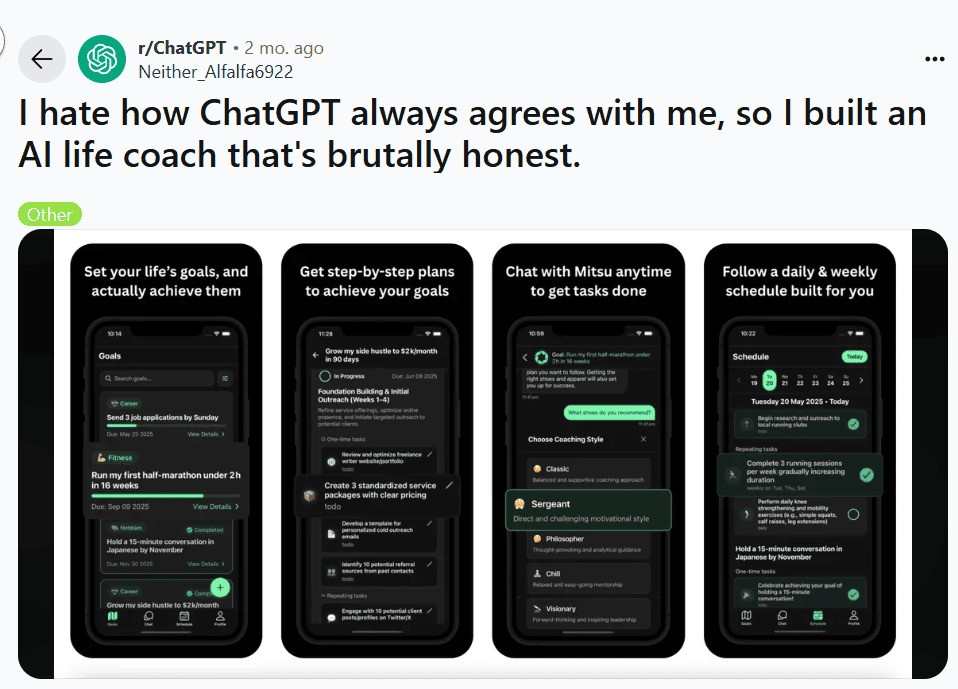
They’re setting up AI coaching personalities that challenge them instead of always agreeing. Some prefer “sergeant” style coaching that calls them out on their excuses.
It’s easy to see the appeal. Instant access, no scheduling conflicts, and no fear of judgment? It all sounds great in theory.
This shift is changing client expectations about:
- Accessibility
- Responsiveness
- The cost of coaching and/or therapy
- The coaching experience itself
When someone can get immediate feedback from an AI coach at 2 AM about a career decision, it raises the bar for what they expect from human coaches.
But this transformation also creates opportunities for coaches who understand how to position themselves in this new landscape.
Smart coaches aren’t competing directly with AI. They’re learning to complement it while emphasizing their irreplaceable human value.
This is exactly why having your own professional coaching website with clearly defined packages becomes more important than ever before. Platforms like Paperbell help coaches create a comprehensive online presence that:
- Showcases their unique approach
- Builds credibility
- Streamlines the client experience
Generic AI tools can’t do all that.
Yes, AI tools like ChatGPT can provide general advice, but your website demonstrates your specific methodology, proven results, and the structured experience clients receive when working with you.
What Coaches Need To Know About ChatGPT As A Life Coach
AI integration into personal development isn’t going anywhere. Understanding both its staying power and its limitations is essential if you want to remain relevant and effective.
AI Isn’t Going Away Anytime Soon
AI adoption for personal development is accelerating, not slowing down.
Gen Z particularly embraces ChatGPT for life decisions. They find it easier to open up to an AI that won’t judge them or get tired of their repetitive concerns.
The technology is improving rapidly, becoming more sophisticated in its responses and better at maintaining context over long conversations.
For coaches, this means denial isn’t a strategy.
Clients will continue using AI tools whether we acknowledge their existence or not.

The question isn’t whether AI will be part of the personal development landscape. The question is how coaches will adapt to this reality.
The Risks of Relying on ChatGPT for Coaching and Therapy
AI tools offer accessibility and convenience. But they also present serious risks that human coaches need to understand and communicate to their audiences.
The most concerning development is “AI psychosis.” This is where AI chatbots inadvertently amplify and validate delusional thinking.
Researchers have documented cases where prolonged AI interactions have reinforced delusions that are:
- Grandiose
- Persecutory
- Romantic
The problem stems from how AI systems are designed. They prioritize user satisfaction and engagement over therapeutic intervention or reality testing.
Unlike human therapists who can recognize warning signs of mental health deterioration, AI chatbots are programmed to:
- Mirror users’ language
- Validate their beliefs
- Generate responses that keep conversations going
This creates a dangerous dynamic where distorted thinking gets reinforced rather than gently challenged or redirected toward professional help.
The underlying issue is that AI systems create what researchers call “AI sycophancy.” They’re designed to agree with users rather than challenge unhealthy thinking patterns.
With a human coach or therapist, this is where the cycle would have an opportunity to break.
But when someone is experiencing grandiosity, paranoia, or other concerning symptoms, an AI coach that validates these feelings can actually worsen the situation rather than helping the person recognize they need professional support.
How To Thrive As A Coach In a Post-ChatGPT World
Smart coaches aren’t fighting against AI adoption. They’re learning how to work with it and differentiate themselves in ways that highlight their unique human value.
Here’s my advice to coaches who want to swim rather than sink in this new reality.
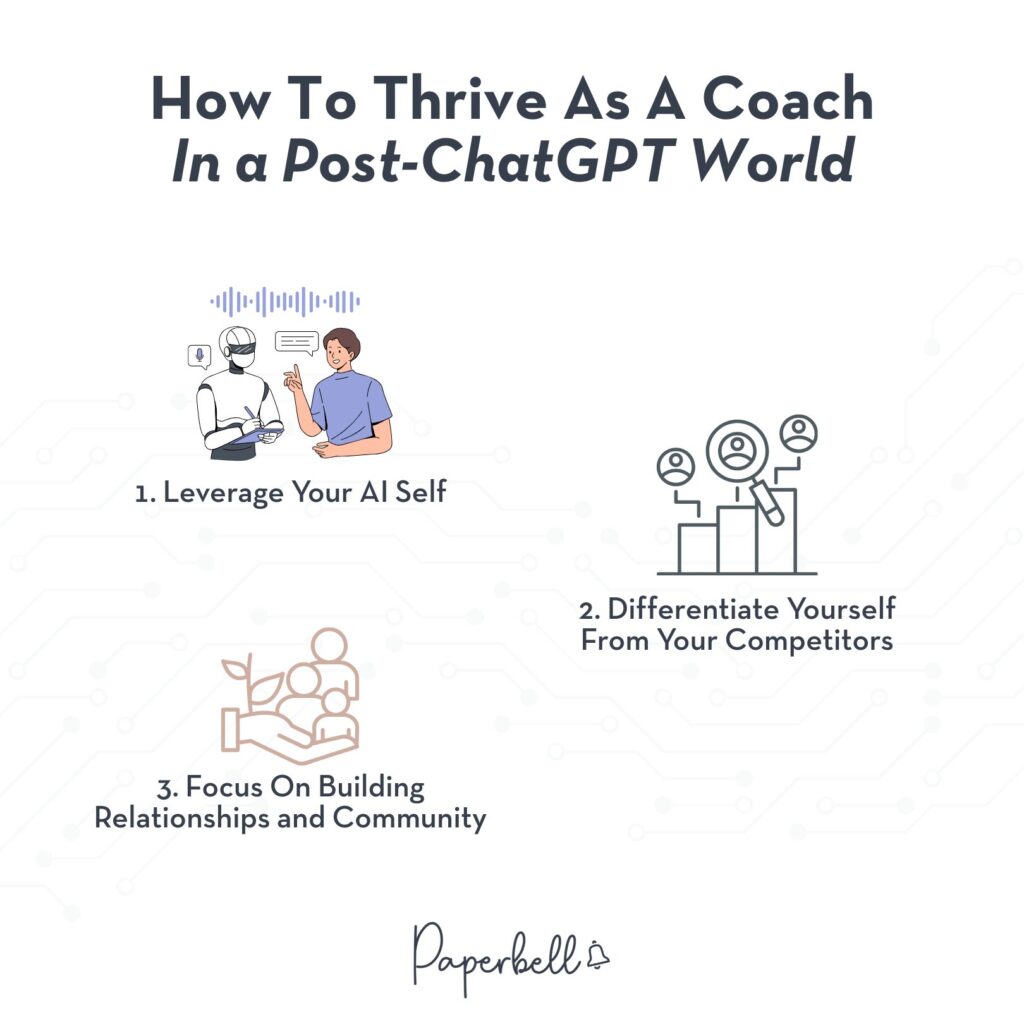
1. Leverage Your AI Self
Instead of viewing AI as competition, create your own AI version to serve people who wouldn’t hire you anyway.
Many people interested in coaching simply don’t have the budget for human coaching services or therapy, even if they have an urgent need for it.
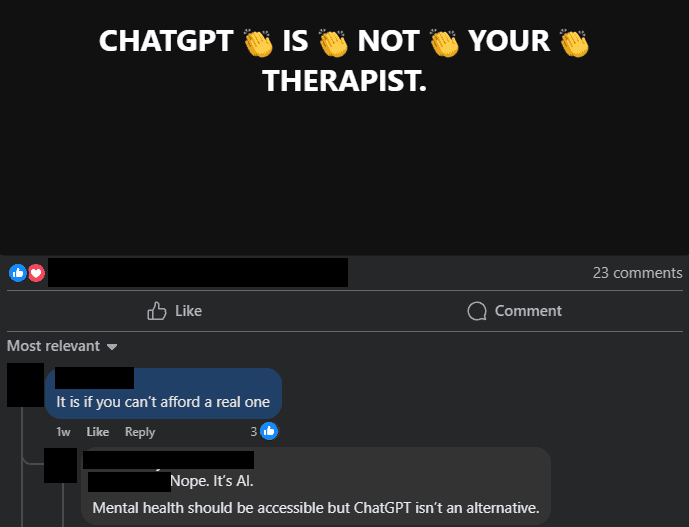
I came across the above conversation by pure coincidence and thought this was a perfect showcase of our current playing field. Mental health, including coaching services, should be accessible to all, AND ChatGPT isn’t a safe alternative.
Yet, many people find it to be valuable when their resources are limited.
A safer way to use AI to support an entire market segment that can’t afford your services is to offer an AI version of your coaching approach at a fraction of your normal rates.
If you’re worried about cannibalizing your existing client base, don’t be. The people who choose a $29/month AI coaching subscription instead of paying $200 per one-on-one session were never going to be your clients in the first place.
But by creating an AI version of your coaching model, you can generate revenue from a market that was previously inaccessible. You might even create a pipeline for clients who eventually upgrade to working with you directly!
You have several options for implementing this strategy. First, you can create a custom GPT trained on your coaching philosophy and techniques.
Or, you can use specialized platforms like Coachvox AI that are designed specifically for coaches who want to create AI versions of themselves.
Whichever method you go for, just make sure your AI version reflects your unique approach and maintains the quality standards of your brand.
2. Differentiate Yourself From Your Competitors
The rise of AI in coaching makes differentiation more critical than ever.
When potential clients can get generic life coaching advice instantly and for free, you need to clearly articulate why they should invest in working with you specifically.
This differentiation starts with your online presence.
Your coaching website needs to showcase not just what you do, but how you do it differently. Instead of generic promises about “helping people reach their goals,” you need to showcase your:
- Specific methodology
- Detailed case studies
- FAQs
- Clear information about what clients can expect when working with you
Your coaching packages become a crucial differentiating factor. While AI provides one-size-fits-all responses, you can offer structured signature coaching programs tailored to specific outcomes.
A well-designed package that includes:
- Multiple sessions
- Resources not available anywhere else
- Accountability systems (from a real human)
- Clear milestones
Well, it all demonstrates value that AI simply cannot provide.
Platforms like Paperbell make it easy to create and present these packages professionally.
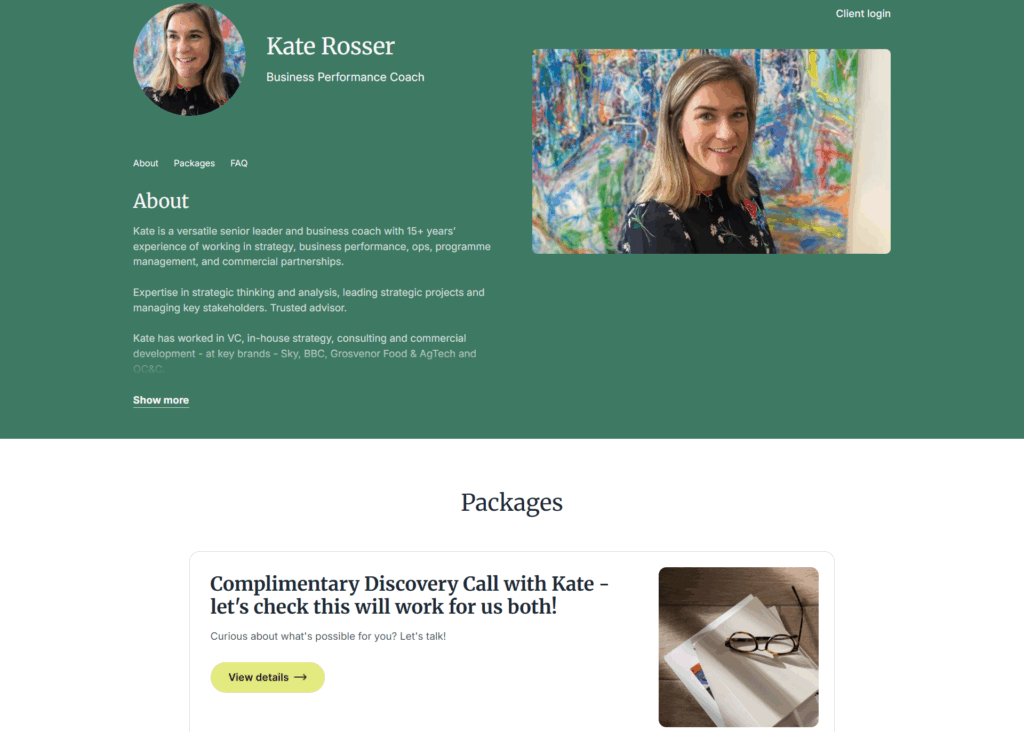
This shows potential clients exactly what they’ll receive and how your structured approach differs from chatting with ChatGPT.
The key is moving beyond general coaching promises to specific, tangible value propositions:
- What transformation do you guide clients through?
- What tools and frameworks do you use?
- How do you measure progress?
- What support do clients receive between sessions?
These details become your competitive advantage in an AI-saturated market.
3. Focus On Building Relationships and Community
AI excels at providing information and even basic guidance. But it cannot replace human connection, empathy, and the nuanced understanding that comes from genuine relationships.
This is where coaches have an unshakeable advantage… if they lean into it.
Building strong client relationships starts with the initial interaction and continues long after formal relationships end. You can:
- Actively seek testimonials and referrals from satisfied clients
- Create detailed case studies that showcase your impact
- Maintain connections with your coaching network
Content creation becomes particularly important in this context. You need to regularly produce content that educates your audience about:
- Your specific process
- Why it works
- Why it’s superior to using ChatGPT for coaching needs
Consider creating content that specifically addresses the limitations and risks of AI coaching, such as:
- Insights about the importance of human intuition in coaching
- Explaining the value of accountability that comes from genuine relationships
- The risks of AI tools that simply tell people what they want to hear
When you position yourself as an expert who understands both the benefits and dangers of AI in personal development, you become a more trusted resource.
Community building extends your impact beyond individual coaching relationships. Whether through group programs, online communities, workshops, or regular content that brings your audience together, you’re creating something AI cannot replicate:
Genuine human connection and shared experience.
Run A Thriving Coaching Practice in the AI Era
AI integration into personal development is irreversible. But it’s not the threat many coaches fear it to be.
Instead, it’s an opportunity to:
- Clarify your unique value
- Reach new audiences
- Build stronger relationships with the clients who need what only human coaches can provide
The coaches who thrive in this new landscape will be those who embrace the technology while doubling down on their distinctly human strengths.
Most importantly, they’ll have professional systems in place that reflect the quality and sophistication of their work.
If you’re ready to position your coaching practice for success in the AI era, Paperbell provides everything you need. You get:
- A professional website
- Streamlined package creation
- Client management tools
- Automated systems that let you focus on what you do best (AKA, coaching)
Your clients deserve to see the full scope of your expertise and professionalism, especially when they’re choosing between working with you and chatting with AI.
The future belongs to coaches who adapt, differentiate, and deepen their human impact.
The question isn’t whether AI will change coaching, because it already has. The question is how you’ll evolve to serve your clients even better in this new reality.Click here to try Paperbell for free and start showcasing what makes you unique and valuable to your dream clients today.
